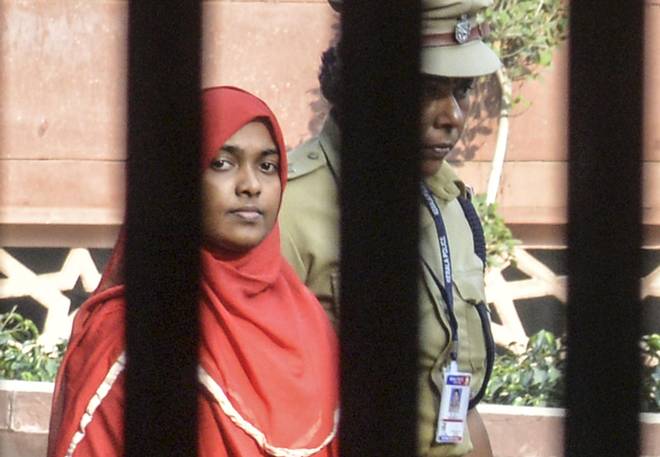There is this 25 year old girl, an age where parents happily marry off their daughters or even today start sharing their "worry" if a potential groom is not on the horizon, and we are being subjected to the sad spectacle of the courts intervening in the life of an adult woman. Why? Because her parents did not want her to marry outside her religion. And more because the BJP sensing an opportunity to further its "love jihad" agenda has decided to “investigate" the “terror links” of the young husband, as he is a Muslim and hence can be so pilloried. Hadiya, as she prefers to be called, has gone through sheer hell in the recent past, her trial having started when she married Shafin Jehan of her own free choice—-that has been established without doubt now—-with the Kerala High Court annuling the marriage and terming it as an incident of ‘love jihad’. And the Supreme Court that was expected to give relief taking the rather strange position of directing the girl to go back to college, with the Dean as her guardian.
Why not to her husband? She is an adult, the man is still innocent, both want to be together so should not an adult woman be allowed to join the man she married? More so, as she has declared—not once but repeatedly despite tremnedous pressure from family, society, and the state— that she was not coerced or forced, and just wants to be with him.
Why has the court, august and honoured, not ruled on the side of gender and justice and allowed Hadiya who has been steadfast and consistent, to join her husband? Why have the judges not credited Hadiya with an intelligent and independent mind? Why has the court insisted on keeping her as an appendage, where the High Court kept her with her father, and the Supreme Court has now left her in the custody of a college Dean?
And why was the phone call to her husband that was finally “allowed” by the Dean, only for a few minutes? Under what law is she prevented from speaking to the man she has married, and stood by? And why can Hadiya not meet her husband if she wants to now? Is she is jail? Does she have no rights as a woman? Is an adult now not allowed to exercise his or her choice of marriage without the state intervening?
The girl is still under pressure. She has no idea whether she will be able to join her husband. The young man must have experienced sheer terror, given the charges slapped against him and an investigation by no less than India’s top agency underway. If Hadiya had turned away under pressure, there is no doubt that Shafin Jehan would have been picked up and thrown into prison. Until he could prove himself innocent. Fortunately for him the young woman did not budge, despite the pressure, despite the trolls, despite the comments by senior leaders, despite the posse of police personnel around her, despite the High Court, and now despite the Supreme Court.
This in spite of an affidavit by the Kerala government rejecting the NIA inquiry into the Hadiya conversion case wherein it had rejected the National Investigation Agency’s claim that the marriage was part of a “pattern of religious conversions and radicalisation.”
It is indeed a sad day when governments and courts intervene in what is a personal choice of two adult individuals. The objection from the current dispensation comes from its declared position against inter religion marriages, its open hostility towards the minorities, its sinister design to isolate and marginalise the minorities through an agenda that seeks to monitor their lives not just in society but also within their own homes, and in this case a larger plan to get a toehold in Kerala via a communal divide.
It becomes more complex when it comes to the ruling of the Kerala High Court, and now the Supreme Court that has allowed Hadiya to go back to her college, but not to her husband. It is not clear what law has been invoked to prevent this, but then in an India where rights and freedoms are being challenged as never before, Hadiya and her husband are "happy" —as the smile on her face showed after she spoke to her husband after months—with what are at the end of it little more than small mercies.
At the end of the long trial Hadiya is now required to be grateful that she is one, still alive; two, her husband is not in jail although there is no guarantee of this even now; three, that she has been allowed to resume her studies; four, that the Dean allowed her a "few minutes" on the phone with her husband. So while the electronic media jumps up and down in sheer hysteria, the real issues and questions go into the background, all of them (as above) to do with an individual’s freedom and her rights.





